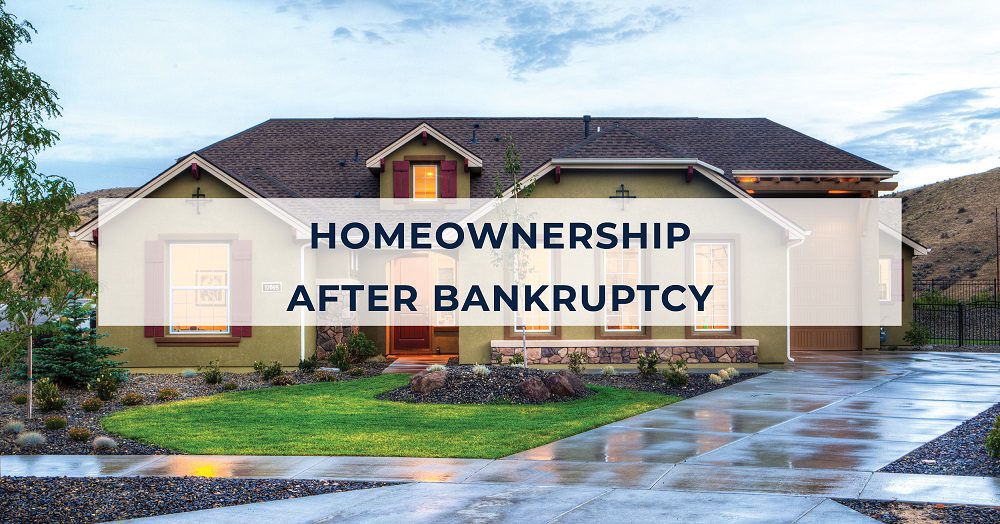
By Alena Kairys
Apr 18, 2023Declaring bankruptcy is financially and emotionally stressful—it’s a situation no one wants to be in. Filing for bankruptcy is a tough decision, but you can bounce back from it and even become a homeowner.
Bankruptcy Types
Individuals can either file for Chapter 7 or Chapter 13 bankruptcy, and they have different implications for your finances and when you can start the mortgage process. After the initial filing, a bankruptcy court can declare it as discharged (eligible debts are removed) or dismissed (the court is not proceeding with bankruptcy filings because of unmet requirements). Your bankruptcy status plays a large role in your timeline for mortgage application.
Chapter 7 Bankruptcy
When you file for Chapter 7 bankruptcy, certain assets are sold to repay creditors, and any leftover debt is discharged. This is the more severe of the two, and the bankruptcy will remain on your credit report for 7 years. You’ll need to wait a minimum of two years before applying for a mortgage, but it can be more depending on the loan program. The wait is two years for FHA and VA loans, three years for USDA loans, and four years for conventional loans. Individual lenders may set their own waiting periods, as well. The waiting period starts after your bankruptcy is dismissed or discharged.
Chapter 13 Bankruptcy
Chapter 13 bankruptcy is not as extreme as Chapter 7; you can keep your assets and must adhere to a court-ordered debt repayment plan. As long as you continue making payments, your assets won’t be seized. It stays on your credit report for 7 years, but the waiting period to get a mortgage can be as little as 1-2 years depending on the loan program, the status of your bankruptcy (dismissed or discharged), and lender requirements. For FHA, VA, and USDA loans, you have to be at least one year into your repayment plan before trying to get a mortgage. For conventional loans, you must wait two years after your bankruptcy was discharged, and 4 years after a dismissal. Generally, you’ll need the court’s approval before applying for a mortgage if you’re still in Chapter 13 bankruptcy.
Improving your Finances
No matter what type of bankruptcy is on your record, it’s crucial to take measures to rebuild your finances and make smart financial choices. The mandatory waiting period is a prime time to improve your credit profile and show lenders that you’re responsible and financially secure enough to handle a mortgage. First, create and stick to a budget that covers your basic needs and any recurring bills. Gradually, you should ideally see more money in your pocket. Put some of that extra cash into savings so it can be used for a down payment or other housing costs. Strengthen your credit score by always making on-time payments, paying in full whenever possible. Don’t max out your credit cards or apply for new ones to keep spending. Avoid taking on unnecessary debt, and lower your debt-to-income ratio (DTI) by paying down existing debts. Repairing your finances won’t happen overnight—it takes time and consistent work.
Things to Consider
When you’re in a better position to start the homebuying process, government-sponsored loans are an excellent choice to consider, as the waiting periods are shorter and have more flexible requirements than conventional loans. Bankruptcy can be caused by a number of issues, both within and outside of your control. Some loan programs may reduce the waiting period if your bankruptcy was caused by a one-time, extenuating circumstance that is well-documented (such as a medical emergency). You might need to provide your lender with a letter of explanation if an extenuating event caused your bankruptcy. Regardless of what type of bankruptcy is on your record, speak with a loan originator to see what options are available for your situation.
Bankruptcy may feel like a death sentence, but it doesn’t have to be. The speed bump that bankruptcy puts in front of homeownership can be used to your advantage by taking steps to restore your finances. When you’re financially, mentally, and emotionally prepared for homeownership, you’ll be set up for success.
If you have any questions about the home buying process, contact one of our licensed Mortgage Loan Originators. If you are ready to buy a home, click here to get started!
NFM Lending is not a debt settlement company or credit repair agency. Speak with a licensed financial advisor regarding your unique financial situation.
LTV’s can be as high as 96.5% for FHA loans. FHA minimum FICO score required. Fixed rate loans only. W2 transcript option not permitted. Veterans Affairs loans require a funding fee, which is based on various loan characteristics. For USDA loans, 100% financing, no down payment is required. The loan amount may not exceed 100% of the appraised value, plus the guarantee fee may be included. Loan is limited to the appraised value without the pool, if applicable. Qualifying credit score needed for conventional loans.
These blogs are for informational purposes only. Make sure you understand the features associated with the loan program you choose, and that it meets your unique financial needs. Subject to Debt-to-Income and Underwriting requirements. This is not a credit decision or a commitment to lend. Eligibility is subject to completion of an application and verification of home ownership, occupancy, title, income, employment, credit, home value, collateral, and underwriting requirements. Not all programs are available in all areas. Offers may vary and are subject to change at any time without notice. Should you have any questions about the information provided, please contact us.